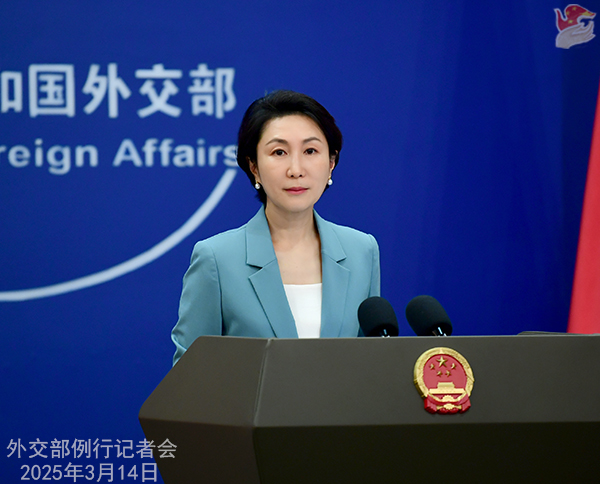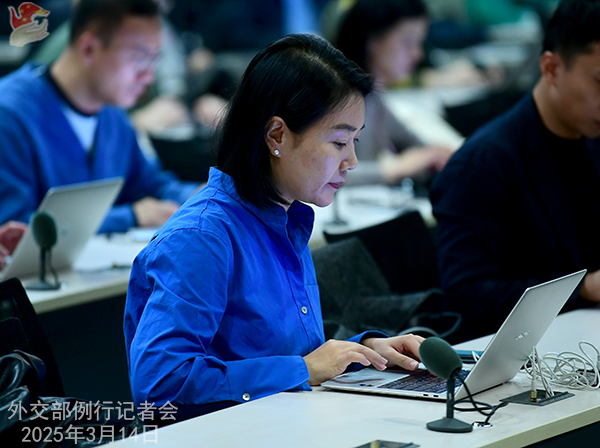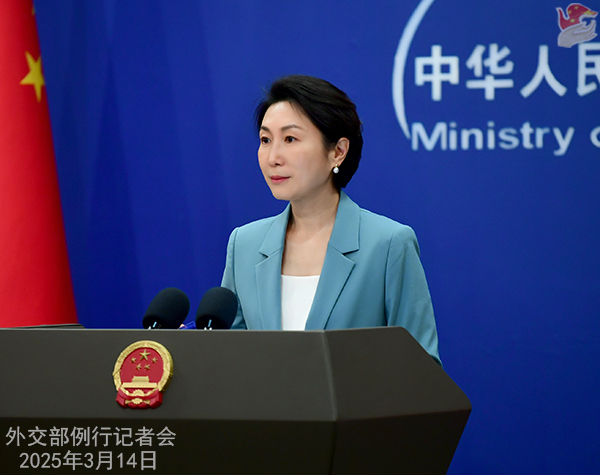
At the invitation of Member of the Standing Committee of the Political Bureau of the CPC Central Committee and Vice Premier of the State Council Ding Xuexiang, Kazakhstan’s First Deputy Prime Minister Roman Sklyar will visit China and the two leaders will co-chair the 12th Meeting of the China-Kazakhstan Cooperation Committee on March 18.
Xinhua News Agency: According to what we have learned, the Beijing meeting between China, Russia and Iran on the Iranian nuclear issue was held today and a joint statement was issued. In your view, what impact will this meeting have on the resumption of dialogue and negotiation? How does China see the prospect of a political and diplomatic resolution to the Iranian nuclear issue?
Mao Ning: Deputy foreign ministers of China, Russia and Iran held a meeting in Beijing. Foreign Minister Wang Yi met with the heads of delegations to the meeting and put forward China’s five-point proposition on the Iranian nuclear issue.
The three parties had an in-depth exchange of views on the Iranian nuclear issue and issued a joint statement. They reiterated that political and diplomatic engagement and dialogue remains the only viable and practical option and called on relevant parties to abandon sanction, pressure and threat of force and refrain from any action that may escalate the situation. The three parties reiterated the importance of the Treaty on the Non-Proliferation of Nuclear Weapons (NPT). China and Russia welcomed Iran’s reiteration that its nuclear programme is exclusively for peaceful purposes and that it does not seek to develop nuclear weapons and supported Iran in continuing cooperation with the International Atomic Energy Agency (IAEA) and stressed the need to respect Iran’s right to peaceful use of nuclear energy.
The Iranian nuclear issue is facing a serious situation and once again at a crossroads. The Beijing meeting is a useful effort by China, Russia and Iran in seeking to advance the political settlement of the Iranian nuclear issue. Sanction, pressuring and threat of force lead nowhere, whereas dialogue and consultation provides the right way forward. We call on parties to step up communication and dialogue and accumulate enabling conditions for talks and negotiations to resume at an early date.
China stands ready to work with other parties for a just, balanced and sustainable resolution to the Iranian nuclear issue, uphold the international non-proliferation regime and promote international and regional peace and stability.
China News Service: On March 13, the presidents of Tajikistan and Kyrgyzstan signed a state border treaty, resolving their border issue once and for all. What’s China’s comment?
Mao Ning: China congratulates Tajikistan and Kyrgyzstan on the signing of a state border treaty, and highly commends the two presidents’ crucial role in seeking the peaceful settlement of the border issue through consultation. This is conducive to peace, stability, development and prosperity in the region.
As both countries’ friendly neighbor and comprehensive strategic partner, China stands ready to work with Tajikistan and Kyrgyzstan to continue to advance good-neighborliness and friendship and mutually beneficial cooperation across the board so as to build an even closer China-Central Asia community with a shared future.
AFP: Another question on the Iranian nuclear issue. Deputy Foreign Minister Ma Zhaoxu said today that China, Russia and Iran stressed it is necessary to end all illicit unilateral sanctions. What is China’s position on U.S. sanctions on Iran?
Mao Ning: China always opposes illicit unilateral sanctions. Deputy Foreign Minister Ma Zhaoxu has shared China’s position, and we have distributed the joint statement on the Beijing meeting, which you may refer to.
CCTV: According to reports, Armenian and Azerbaijani foreign ministries said in their statements released on Thursday that they had completed negotiations on the draft of a peace agreement, which is expected to end nearly four decades of dispute between the two countries. What’s China’s comment?
Mao Ning: China is glad to see positive progress in the peace process between Armenia and Azerbaijan. Both countries are important nations in Transcaucasia and China’s good friends and good partners. China sincerely hopes the two countries can settle differences and disputes through dialogue and consultation, and contribute to lasting peace, development and prosperity in the region.

China Daily: We noted that the Report on the Work of the Government mentions new concepts such as embodied AI and gazelle companies. It says that we need to develop new quality productive forces in light of local conditions and accelerate the development of a modernized industrial system. What’s your comment?
Mao Ning: The new concepts that you mentioned are the very examples of new quality productive forces. The new quality productive forces are those driven by technological and industrial innovation. “New” is what makes them different from other productive forces. Large-scale AI model, quantum computer, humanoid robot, and unmanned new energy vehicle all bring out the charm of the new quality productive forces. China actively explores new energy, new material and new technology, and develops new quality productive forces through technological innovation. The new quality productive forces also speed up the transition from old growth drivers into new ones, enhance the efficiency of resource allocation, promote industrial transformation and upgrade, and offer fresh impetus to high-quality development.
China’s new quality productive forces are also integrated into global industrial, supply, and value chains. Chinese companies have taken advanced manufacturing, clean energy, smart network and other new technologies and products to the global market, offering more choices to the world. China also shares with other countries, developing countries in particular, progress in technological innovation, and galvanizes the green transition and industrial upgrade in relevant countries.
The new quality productive forces empower China and enrich the world. As China goes forward, new quality productive forces will be important drivers for growth.
Bloomberg: The EU’s top diplomat Kallas said that China is laughing at U.S. trade wars, including America’s 200 percent tariff on European wine, for example. Can you respond?
Mao Ning: We have stressed on multiple occasions that tariff wars and trade wars have no winners. We have no comment on how the U.S. and the EU get along, but we oppose directing the issue at China. Both the U.S. and the EU are important economies in the world. They have a responsibility to uphold the WTO-centered multilateral trading system, rather than deflecting the tension on someone else.
Bloomberg: Putin has proposed holding talks with Trump on the proposed temporary ceasefire on Ukraine. Can you give us China’s viewpoint?
Mao Ning: We noted the reports. On the Ukraine crisis, China has all along followed the four points proposed by President Xi Jinping on what must be done, namely, the sovereignty and territorial integrity of all countries should be respected, the purposes and principles of the UN Charter should be observed, the legitimate security concerns of all countries should be taken seriously, and all efforts conducive to a peaceful settlement of the crisis should be supported. We hope relevant parties will reach a fair and durable peace deal that is binding and accepted by all the parties concerned through dialogue and negotiation. China stands ready to work with the international community and continue to play a constructive role in resolving the crisis and realizing lasting peace.
AFP: In 2023, a Chinese professor at the Kobe Gakuin University in Japan went missing when visiting his relatives in China. The university said today that he returned to Japan in January this year. There is speculation that Chinese authorities had detained him for suspected espionage. Can you share more about the case?
Mao Ning: I’m not familiar with the specifics you mentioned.
AFP: The U.S. Department of Agriculture says that the China export licenses of hundreds of abattoirs in the U.S. are due to expire this weekend. It says that China Customs has not responded to requests for these licenses to renew. So is China letting these licenses lapse deliberately as part of ongoing trade tension between China and the U.S.?
Mao Ning: I’m not familiar with the specifics you mentioned and would refer you to competent Chinese authorities.
